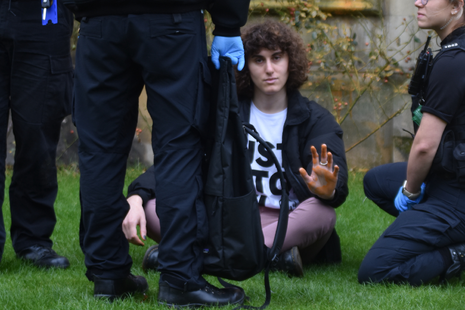Just Stop Overreacting
Our contempt for Just Stop Oil’s methods is concerningly over the top, argues Tom Ainscough

“You don’t deserve to live!”, one Cambridge activist was informed as she sat in front of her monochrome graffiti – the orange paint on King’s College’s wall.
Just Stop Oil activists receive a vast amount of hate. On YouTube, the ten most viewed videos for ‘Just Stop Oil’ show activists being physically abused, verbally abused, or ridiculed. The comment sections all laugh along. Figures from Keir Starmer to Piers Morgan contend it’s not the message they dislike, it’s the methods. Certainly, the methods are controversial. Although Just Stop Oil activists sometimes target fuel terminals and government buildings, they overwhelmingly target us. It’s hard not to sympathise with the son who missed his father’s funeral, or the student who missed their exam.
“Their peaceful protesting seems to be getting results”
Yet, a court decision last month suggests this collective hatred has crossed a line. In a record-breaking prison sentence for peaceful protest, five Just Stop Oil activists were jailed for between four and five years for plotting the partial M25 disruptions in 2022. One of them had merely attended the Zoom call. The sentence was only made possible by the Police, Crime, Sentencing and Courts Act 2022 – part of a series of controversial tightening of laws against protesting in the past two years, some of which were direct responses to Just Stop Oil’s tactics. Now, the five are locked away longer than the averages for robbery, drug offences, and criminal damage and arson – while our prisons are dangerously overcrowded. The UN special rapporteur present at the trial called it “appalling” and a potential breach of international law.
It becomes less justifiable to respond so forcefully to Just Stop Oil’s methods when, in comparison to historic direct action, they are invariably peaceful and often tame. Instead of hacking apart artwork like the suffragette Mary Richardson, Phoebe Plummer threw tomato soup on its protective glass. Rather than blocking a racehorse like Emily Davison, Jacob Bourne darted between players at the Ashes test match. The protesters do not engage in altercations with vexed motorists, and are mindful of emergency services through their blue light policy. Even the “criminal damage” caused by their orange powder paint method is temporary. Neither Stonehenge, the Bank of England or even King’s College have experienced permanent damage.
What’s more, their peaceful protesting seems to be getting results. One aspect of this is their astounding publicity, important in keeping climate change on the political radar. ‘Just Stop Oil’ currently returns 8,452 results in The Times – 1,515 more than Liz Truss, and a whopping 7,132 more than Extinction Rebellion. They also succeed in influencing policy. Up until recently, Just Stop Oil’s primary demand had been to stop the issuing of new fossil fuel licences, which the new government has now pledged to do. Labour’s bigwigs, I’m sure, used a huge variety of data to decide what to put in their manifesto, meaning the influence of Just Stop Oil could never be quantified. But, by giving the radical environmental flank such mammoth publicity despite only being founded in 2022, I find it hard to believe that their influence, whether via the public that Labour was analysing or the politicians themselves, was nil.
“Creeping limitations on this fundamental democratic right is a regression we can’t afford to make”
Our overreaction can be seen by looking at this success alongside our concern for climate change, then comparing the picture with our contemptuous response. As it stands, 66% of the country are ’worried’ about climate change. When such a significant majority is worried, it is hard to argue that Just Stop Oil’s success in encouraging climate-conscious debate and policy is unwelcome. Anger to a certain point can be justified, because many believe Just Stop Oil should be using less disruptive methods to achieve these same outcomes. Just Stop Oil doesn’t agree, because less disruptive protests have been used by eco-activists for years. Not nearly as many remember the tens of thousands of protesters marching in Glasgow compared to the soup on Van Gogh’s ‘Sunflowers’. But, anger to the point of record-breaking prison sentences, public hatred, and a spate of laws cracking down on protests is not so legitimate.
Looking more widely, these harsher sentences and attitudes will make protests of all varieties harder. Yet, surely everyone can think of protests from which they have benefited, be it in their lifetimes, or before. This is not to mention protesters in less liberal countries, where our precedent will only help to justify their oppression. Creeping limitations on this fundamental democratic right is a regression we can’t afford to make.
So, consider saving your contempt for those who aren’t peaceful, who aren’t moderate, and who aren’t effective. We’ve seen enough rioting this month to know what they might look like. Just Stop Oil’s methods can be infuriating, but four years in jail for planning a peaceful protest on a Zoom call certainly seems like an overreaction.
 News / Eight Cambridge researchers awarded €17m in ERC research grants27 December 2025
News / Eight Cambridge researchers awarded €17m in ERC research grants27 December 2025 News / Clare Hall spent over £500k opposing busway 24 December 2025
News / Clare Hall spent over £500k opposing busway 24 December 2025 Comment / League tables do more harm than good26 December 2025
Comment / League tables do more harm than good26 December 2025 News / Caius mourns its tree-mendous loss23 December 2025
News / Caius mourns its tree-mendous loss23 December 2025 Comment / The ‘class’ of Cambridge24 December 2025
Comment / The ‘class’ of Cambridge24 December 2025










